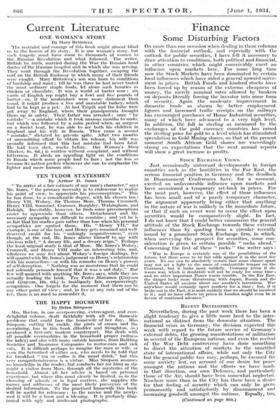TEN TUDOR STATESMEN
By Arthur D. 1nnes
" To arrive at a fair estimate of any man's character," says Mr. Innes, " the primary necessity is to endeavour to realize his point of view, to appreciate his preconceptions." This he has done, to a considerable degree, with his chosen ten : Henry VII, Wolsey, Sir Thomas More, Thomas Cromwell, Henry VIII, Somerset, Cranmer, Burghley, Walsingham, and Raleigh. Inevitably, however, he finds some preconceptions easier to appreciate than others. Detachment and the necessary sympathy are difficult to combine ; and yet he is so fair that his studies gain rather than lose when his personal sympathies are against them. His " Henry VII," for example, is one of the best, and Henry gets reasoned and well- deserved credit for his " unkingly acquisitiveness," even though, at the end, Mr. Innes allows himself to say with obvious relief, " A dreary life, and a dreary reign." Perhaps the least original study is that of More. Mr. Innes's Wolsey, Cromwell, and Henry VIII make an interesting trio, and, whatever we may feel -about Wolsey's foreign dealings, few will quarrel with Mr. Innes's judgement on Henry's relationship with his counsellors—or with his remarks on Henry's powers of self-deception. " Nothing was so monstrous that he could not solemnly persuade himself that it was a sad duty." But few will quarrel with anything Mr. Imes says, while they are actually reading the book. Ten Tudor Statesmen (Grayson and Grayson, 10s. 6d.) is insiditusly fair, overpoweringly scrupulous. One forgets for the moment that there can be any other point of view ; and, in five at any rate out of the ten, there is no need to teniember it.




































 Previous page
Previous page